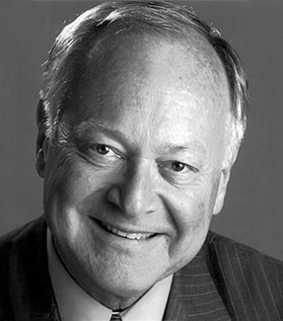2008 Hall of Achievement Inductee

Doug Bates grew up in Oakridge, Oregon, a booming mill town at the time. His father owned a small shoe store that catered to loggers and mill workers. In lieu of advertising in the local weekly paper, he wrote advertorial columns—an early influence on Bates’ successful career as a writer and editor.
Bates married his high school sweetheart, Gloria Burton, during his freshman year at the University of Oregon, where he majored in journalism. He worked his way through college working in the ad service department of The Register-Guard and playing in a rock band called the Apollos. His sons, Steve and Mike, were born by the time he graduated in 1968.
Bates describes his adviser, John Hulteng, as “a superb teacher and good friend.” Hulteng helped him get his first job, at the now-defunct Spokane Chronicle. After one year there he returned to Eugene to join the reporting staff of The Register-Guard, beginning a fifteen-year stint there. The couple adopted two daughters, Lynn and Liska, who would later inspire his book Gift Children: A Story of Race, Family, and Adoption in a Divided America.
Bates left The Register-Guard for one year in 1984 to become general news editor at The Seattle Times, then returned to Eugene to become assistant managing editor, and later, managing editor. He left The Register-Guard for good in 1989 to write books and motion picture screenplays. He sold two scripts and authored a book called The Pulitzer Prize: The Inside Story of America’s Most Prestigious Award (1991).
He returned to the newspaper business for two years at The San Diego Union, becoming its assistant managing editor when it merged with The San Diego Tribune. He left in 1992 to spend a year at the coast, writing Gift Children. Shortly after its 1993 publication, he returned to the newsroom, this time to The Oregonian, attracted by a dynamic new editor from Virginia, Sandy Rowe. There he directed crime and business news for two years.
Seeking a change in the pace, however, he retreated to a home on the banks of the Deschutes River south of Bend. Within a year, he was back in the newsroom, hired by Rick Attig, then executive editor of The Bulletin.
It was, as Bates describes it, “the beginning of a fateful partnership and great friendship.” Attig left The Bulletin in 1998; shortly thereafter, Bates joined him at The Oregonian.
Fifteen years later, the two would collaborate on a series of editorials to win America’s most prestigious award. The 2006 Pulitzer Prize for Editorial Writing was awarded to Attig and Bates, “for their persuasive, richly reported editorials on abuses inside a forgotten Oregon mental hospital.” The series, “Oregon’s Forgotten Hospital,” exposed the shameful truth about Oregon’s neglected, overcrowded state mental hospital in Salem and resulted in a positive reforms in the system. Another collaboration, on uninsured children in Oregon, earned a number of honors, including the 2008 National Headliner Award and the Casey Medal for Meritorious Journalism.
Bates, who continues to serve as associate editorial page editor of The Oregonian, says he is looking forward to more years of working for Sandy Rowe and with his friend and colleague Rick Attig “to produce journalism that makes a difference in Oregon.”
